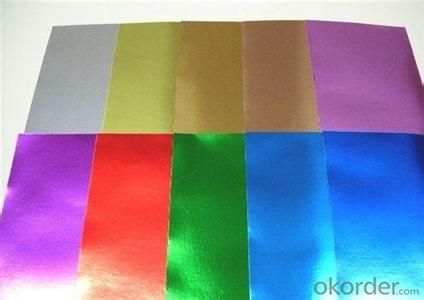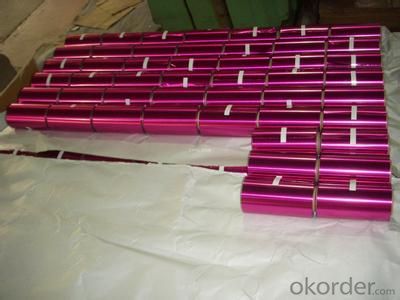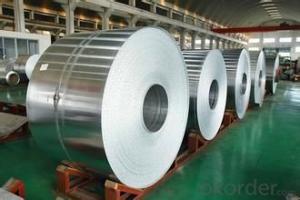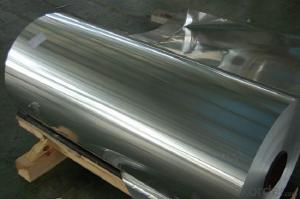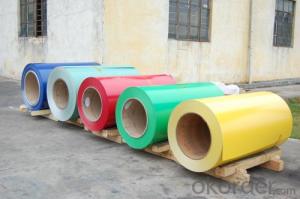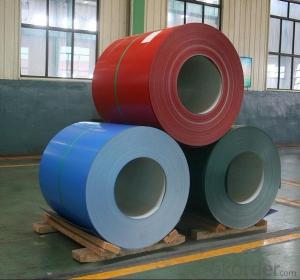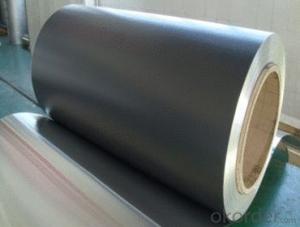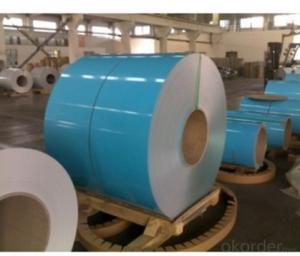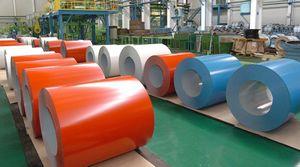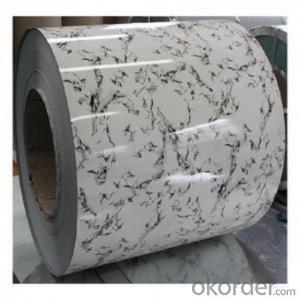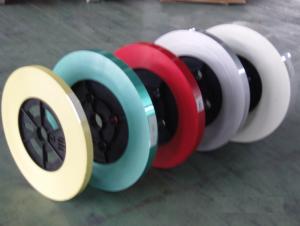Aluminum Painted Coil with PVDF Coating
- Loading Port:
- Shanghai
- Payment Terms:
- TT OR LC
- Min Order Qty:
- 8 m.t.
- Supply Capability:
- 2000 m.t./month
OKorder Service Pledge
OKorder Financial Service
You Might Also Like
Specification
Structure of Aluminium Prower Coating with PVDF Coil/Sheet:
Coated aluminum coil/sheet are of a wide range of colors, which gives wonderful appearance no matter in residential and commercial constructions of great exhibition centers.
The coated aluminum coil/sheet have been widely used in the fields of construction and decoration( garage doors, ceiling etc.), electronic appliances, lighting decoration, air-condition air pipes, sandwich panels and drainages etc.
Main Features of Aluminium Prower Coating with PVDF Coil/Sheet:
1) High flexibility
2) Impact resistance
3) Excellent weather-proof durability
4) Anti-ultraviolet
5) High erosion resist
Images of the Aluminium Prower Coating with PVDF Coil/Sheet:
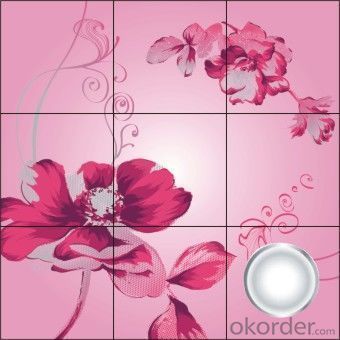
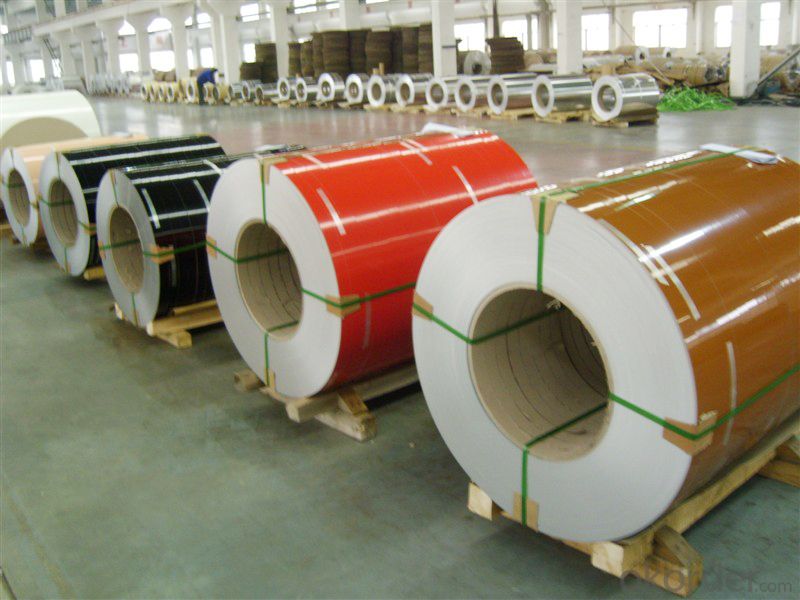
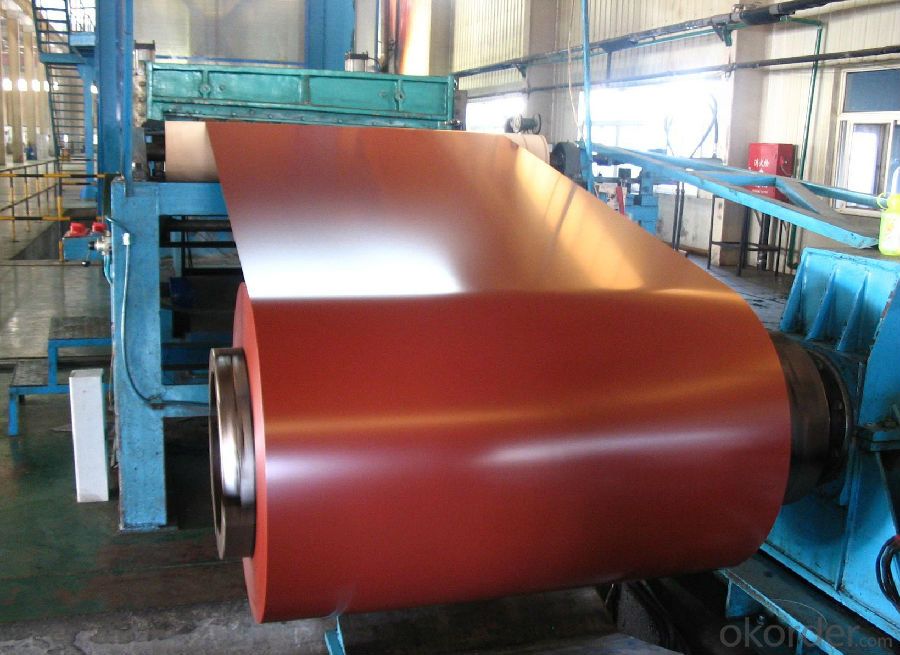
Aluminium Prower Coating with PVDF Coil/Sheet Specification:
Alloy | A1100,A3003,A1050,A8011 etc |
Temper | H16,H18,H24 |
Thickness | From 0.024mm to 1.2mm |
Width | Standard width:1240mm |
Special width:1300mm,1520mm,1570mm,1595mm | |
Diameter | Standard dia:1200mm |
Interior dia:150mm,405mm,505mm | |
Weight | 2.5 T/coil,3.0 T/coil |
Coating | PE, PVDF, AC |
Surface | Embossed, mill finish, coated |
Color | AS to code RAL |
Gloss | 10-90%(EN ISO-2813:1994) |
Coating Thickness | PE: more than 18 micron |
PVDF: more than 25 micron | |
Coating Hardness (pencil resistance) | More than 2h |
Coating adhesion | 5J(EN ISO-2409:1994) |
Impact Resistance | No peeling or cracking(50 kg/cm,ASTMD-2794:1993) |
Flexibility (T-bend) | 2T |
MEK resistance | More than 100 |
FAQ Aluminium Prower Coating with PVDF Coil/Sheet:
a.What is monthly capacity
---CNBM is one stated own company and our monthly capacity is about 2000tons.
b. Now which countries do you export your goods?
---Now we export to South East Asia,Africa, North America,South America ect.
- Q: Can aluminum coils be customized in terms of thickness?
- Aluminum coils can indeed undergo customization in terms of thickness. The specific requirements of a particular application can determine the adjustment of aluminum coils' thickness. This customization is attained through the process of aluminum coil slitting, which involves cutting the original coil into narrower coils of the desired thickness. This method enables the flexibility to meet a range of needs and specifications across diverse industries.
- Q: What are the different protective coatings available for aluminum coils?
- Aluminum coils can be protected by various types of coatings. Some popular options include: 1. Polyester Coating: This coating is versatile and offers excellent resistance to weather and color fading. It is commonly used in outdoor settings where the coils may face harsh weather conditions. 2. Polyvinylidene Fluoride (PVDF) Coating: PVDF coatings are highly durable and resistant to fading, chalking, and chemicals. They are often used in architectural applications that require a long-lasting and high-performance finish. 3. Epoxy Coating: Epoxy coatings provide strong adhesion and corrosion resistance. They are frequently utilized in industrial settings, such as the production of appliances or automotive parts. 4. Acrylic Coating: Acrylic coatings offer good weather resistance and protection against UV rays. They are commonly used indoors or in areas with mild outdoor exposure. 5. Polyurethane Coating: Polyurethane coatings are known for their high impact resistance and flexibility. They are often chosen for applications where the coils may undergo physical stress or deformation. 6. Ceramic Coating: Ceramic coatings provide exceptional heat resistance and thermal stability. They are commonly used in automotive applications or areas with high-temperature exposure. In conclusion, the selection of a protective coating for aluminum coils depends on specific requirements, such as weather resistance, durability, or chemical resistance. It is crucial to consider environmental conditions and performance expectations when choosing the appropriate coating.
- Q: What is the typical coefficient of friction for aluminum coils?
- The typical coefficient of friction for aluminum coils can vary depending on various factors such as the surface conditions, lubrication, and the specific type of aluminum alloy used. However, in general, the coefficient of friction for aluminum coils is relatively low compared to other materials. It typically falls within the range of 0.1 to 0.4.
- Q: How are aluminum coils used in the production of architectural panels?
- Aluminum coils play a crucial role in the production of architectural panels by serving as the primary material for their construction. These coils are typically made from high-quality aluminum alloy, which possesses several desirable characteristics such as lightweight, corrosion resistance, and malleability. The first step in using aluminum coils for architectural panels involves uncoiling the raw material. The coils are unwound and flattened to create flat sheets of aluminum. These sheets are then cut to the desired size and shape, depending on the specific architectural panel design requirements. Once the aluminum sheets are prepared, various manufacturing techniques can be used to further process them. These techniques include bending, folding, welding, and punching to achieve the desired panel shape and functionality. The malleability of aluminum allows for precise shaping and customization, making it an ideal material for architectural panel production. Additionally, aluminum coils can be coated or treated to enhance their appearance, durability, and performance. Coatings such as paint, powder coating, and anodizing can be applied to the aluminum surface to provide protection against weathering, UV radiation, and corrosion. These coatings can also offer aesthetic options, allowing architects and designers to choose from a wide range of colors and finishes for their architectural panels. Architectural panels manufactured using aluminum coils offer numerous benefits. Firstly, due to the lightweight nature of aluminum, these panels are easier to handle and install, reducing labor costs and time. Additionally, aluminum's corrosion resistance ensures that architectural panels remain durable and visually appealing even in harsh weather conditions. The malleability of aluminum also allows for intricate designs and complex shapes, enabling architects to create visually striking and unique building facades. In conclusion, aluminum coils are an essential component in the production of architectural panels. Their lightweight, corrosion resistance, and malleability properties make them an ideal material for creating durable and aesthetically pleasing panels. Whether it is for high-rise buildings, residential homes, or commercial structures, aluminum coils are instrumental in the production of architectural panels that enhance the visual appeal and functionality of modern architecture.
- Q: This question asks for the uses or applications of aluminum coil in various industries or contexts.
- <p>Aluminum coil has a wide range of applications due to its lightweight, corrosion resistance, and high thermal conductivity. It is commonly used in construction for roofing and siding, in the automotive industry for parts and heat exchangers, and in the packaging industry for food and beverage cans. Additionally, aluminum coil is utilized in electrical applications such as transformers and electrical wiring due to its excellent conductivity. It is also employed in the manufacturing of household appliances, furniture, and various consumer goods. The coil's malleability makes it suitable for forming into various shapes and sizes, enhancing its versatility across different sectors.</p>
- Q: Can aluminum coils be used for roofing?
- Yes, aluminum coils can be used for roofing. Aluminum is a popular choice for roofing materials due to its durability, lightweight nature, and resistance to corrosion. Aluminum roofing coils are frequently used in various types of roofs, including residential, commercial, and industrial buildings. They offer excellent protection against extreme weather conditions, such as heavy rain, snow, and high winds. Additionally, aluminum coils are energy-efficient as they can reflect heat from the sun, helping to keep the building cool and reducing energy costs. Overall, aluminum coils provide a reliable and long-lasting roofing solution.
- Q: Are there any recycling programs for used aluminum coils?
- Yes, there are recycling programs available for used aluminum coils. Aluminum is highly recyclable and can be melted down and reused without losing its quality. Many recycling centers and scrap metal yards accept aluminum coils for recycling. Additionally, some HVAC (Heating, Ventilation, and Air Conditioning) companies have their own recycling programs for used aluminum coils, as they are commonly used in air conditioning systems. It is always recommended to check with your local recycling center or HVAC companies to inquire about specific recycling programs for used aluminum coils in your area.
- Q: and alsoHow many grams of the decay product will have formed after 8 days go by?The decay product is the new isotope created as a result of the positron decay of aluminum-24.In class my teacher didn't explain this completely but there's a question on the homework that me and even my mom (another teacher) can't find the answer to.
- so it 6000/ (2*8*24*60*60) 0.00434027778 grams have you heard of the internet an unless your mom is a chem teacher it doesnt mean much
- Q: Are aluminum coils susceptible to warping or bending?
- Yes, aluminum coils are susceptible to warping or bending due to their relatively low strength and flexibility.
- Q: Can aluminum coils be used in coil coating processes?
- Yes, aluminum coils can be used in coil coating processes. Coil coating is a continuous and automated process that involves applying a protective or decorative coating to a coil of metal, typically steel or aluminum. Aluminum coils are commonly used in this process due to their excellent corrosion resistance, lightweight nature, and ease of forming. The aluminum coils undergo various pre-treatment processes like cleaning, chemical treatment, and primer application before the actual coating is applied. These coils are then coated with a wide range of materials, including paints, lacquers, and polymers, to enhance their appearance, durability, and performance. The coil coating process allows for efficient and consistent coating application, making it an ideal choice for various industries such as construction, transportation, and appliances.
Send your message to us
Aluminum Painted Coil with PVDF Coating
- Loading Port:
- Shanghai
- Payment Terms:
- TT OR LC
- Min Order Qty:
- 8 m.t.
- Supply Capability:
- 2000 m.t./month
OKorder Service Pledge
OKorder Financial Service
Similar products
Hot products
Hot Searches
Related keywords



